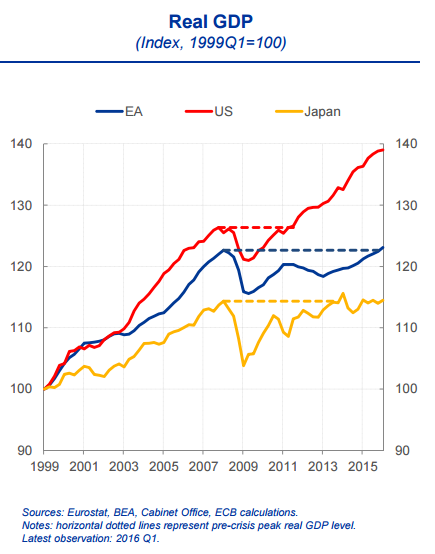Studies in this week’s Hutchins Roundup find that during secular stagnation uncoordinated expansionary monetary policy has a negative spillover to other countries while expansionary fiscal policy has a positive spillover, the healthy life expectancy of the elderly has increased recently, and more.
Uncoordinated monetary policy results in beggar-thy-neighbor effects during secular stagnation
Gauti Eggertsson, Neil Mehrotra, and Sanjay Singh of Brown and Lawrence Summers of Harvard show that uncoordinated expansionary monetary policy in a two-economy model of secular stagnation – a condition characterized by a zero lower bound, low inflation or deflation, and a persistent output gap – results in improvement of conditions in one country at the expense of the other, but expansionary fiscal policy has positive effects across countries. Furthermore, they conclude that expansionary fiscal policy at a time of secular stagnation will result in a lower debt to GDP ratio.
The elderly can expect to live not just longer lives but also longer healthy lives
Michael Chernew, David Cutler, and Mary Beth Landrum of Harvard and Kaushik Ghosh of the National Bureau of Economic Research find that, between 1992 and 2008, overall life expectancy in the U.S. at age 65 increased by 1.3 years, while ”healthy life expectancy”—the number of years spent in good health—increased even more, by 1.8 years. The largest improvements in healthy life expectancy came from reduced incidence and improved functioning for those with cardiovascular disease and vision problems, which together account for 63 percent of the improvement. The authors estimate that about 15 percent of the increase in healthy life expectancy is the result of improved medical treatments for cardiovascular disease and about 5 percent is due to greater use of cataract surgery.
The power of traditional monetary policy relationships might have changed
Using annual data on 46 countries between 1950 and 2011, Pavel Gertler of the National Bank of Slovakia and Boris Hofmann of the Bank for International Settlements conclude that the link between money growth and inflation has weakened over time, especially in advanced economies, but the link between credit growth and financial crisis has become stronger, and more so for advanced economies than for emerging markets. The authors suggest that low inflation and highly liberalized financial systems strengthen the link between credit expansion and financial crises, but weaken the link between money growth and inflation.
Chart of the week: Recovery in the Euro area and Japan has lagged behind that in the U.S.
Quote of the week: “I … see no obvious slowdown in the pace or the potential benefits of innovation in America,” says Fed’s Chair Janet Yellen
“There is some evidence that the deep recession had a long-lasting effect in depressing investment, research and development spending, and the start-up of new firms, and that these factors have, in turn, lowered productivity growth. With time, I expect this effect to ease in a stronger economy. I also see no obvious slowdown in the pace or the potential benefits of innovation in America, which likewise may bear fruit more readily in a stronger economy. In the meantime, it would be helpful to adopt public policies designed to boost productivity. Strengthening education and promoting innovation and investment, public and private, will support longer-term growth in productivity and greater gains in living standards.”
—Janet Yellen, Chair of the Federal Reserve Board
The Brookings Institution is committed to quality, independence, and impact.
We are supported by a diverse array of funders. In line with our values and policies, each Brookings publication represents the sole views of its author(s).




Commentary
Hutchins Roundup: Secular stagnation, healthy life expectancy, and more
June 9, 2016